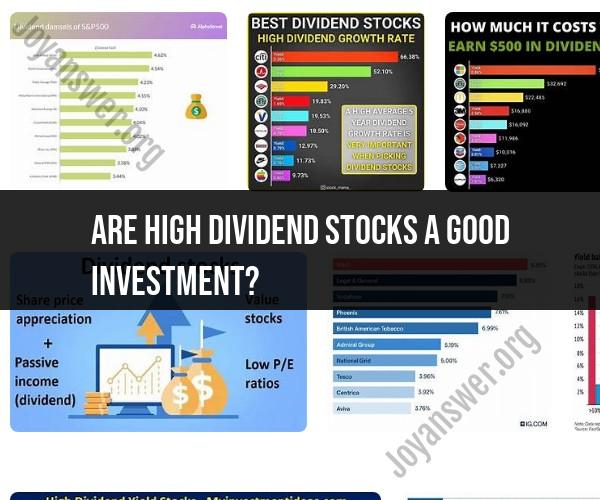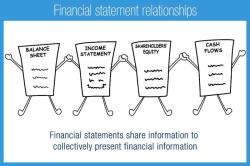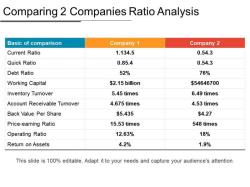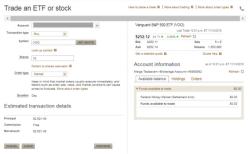Are high dividend stocks a good investment?
High dividend stocks can be a good investment for certain investors, but whether they are a good fit for your investment strategy depends on your financial goals, risk tolerance, and overall portfolio diversification. Here are some factors to consider when evaluating high dividend stocks as an investment:
Pros of High Dividend Stocks:
Income Generation: High dividend stocks can provide a steady stream of income, making them attractive to income-oriented investors, particularly retirees who rely on dividends for living expenses.
Dividend Growth Potential: Some high dividend stocks may have a history of increasing their dividend payouts over time. This can help investors keep pace with inflation and potentially increase their income over the years.
Portfolio Diversification: Dividend stocks, including high dividend stocks, can add diversification to a portfolio, especially if they come from different sectors of the economy.
Historical Stability: Companies that consistently pay high dividends often have stable cash flows and may be less volatile than growth stocks.
Cons of High Dividend Stocks:
Risk of Dividend Cuts: High dividend yields may be unsustainable if a company's financial health deteriorates. There is a risk that the company may reduce or eliminate its dividends, leading to a drop in the stock's price.
Opportunity Cost: Investing in high dividend stocks may mean missing out on potential capital appreciation from growth stocks, which reinvest earnings back into the company instead of paying high dividends.
Sector Concentration: Some industries, such as utilities and real estate investment trusts (REITs), are known for high dividend yields. Relying heavily on these sectors may lead to sector concentration risk.
Tax Implications: Dividends are typically taxed at a different rate than capital gains. Depending on your tax bracket, this can affect the after-tax return on your investments.
Market Interest Rates: High dividend stocks can become less attractive to investors when interest rates rise because fixed-income investments become more competitive.
In summary, high dividend stocks can be a good investment if you prioritize income, have a long-term investment horizon, and carefully select stocks from financially stable companies. However, it's essential to conduct thorough research on individual stocks, assess their sustainability of dividends, and consider how they fit within your overall investment strategy. Diversification across asset classes, including a mix of dividend and growth stocks, can help balance risk and potential return in your portfolio. Additionally, consulting with a financial advisor can provide personalized guidance based on your specific financial situation and goals.
High Dividend Stocks: A Wise Investment or Risky Proposition?
High dividend stocks are stocks of companies that pay a high percentage of their earnings to shareholders in the form of dividends. These stocks are often appealing to investors who are looking for a steady stream of income. However, it is important to understand the risks involved before investing in high dividend stocks.
The Allure of High Dividend Stocks: Analyzing Investment Potential
High dividend stocks can be a good way to generate income for investors. Dividends are typically paid quarterly, and they can provide a significant source of income for investors in retirement. Additionally, high dividend stocks can also provide capital appreciation over time.
However, it is important to note that high dividend stocks are not without risk. One risk is that the company may cut or eliminate its dividend payments in the future. This can happen if the company experiences financial difficulties. Additionally, high dividend stocks may be more volatile than other types of stocks. This means that their prices can fluctuate more wildly.
Wealth Through Dividends: Evaluating the Pros and Cons of High Dividend Stocks
Pros:
- High dividend stocks can provide a steady stream of income.
- High dividend stocks can also provide capital appreciation over time.
- High dividend stocks can be a good way to diversify a portfolio.
Cons:
- High dividend stocks are riskier than other types of stocks.
- Companies may cut or eliminate their dividend payments in the future.
- High dividend stocks may be more volatile than other types of stocks.
Overall, high dividend stocks can be a good investment for investors who are looking for a steady stream of income and are willing to take on some risk. However, it is important to carefully evaluate the risks involved before investing in high dividend stocks.
Here are some tips for investing in high dividend stocks:
- Choose companies with a strong financial track record. Look for companies that have consistently paid and increased their dividends over time.
- Diversify your portfolio. Don't put all your eggs in one basket. Invest in a variety of high dividend stocks from different industries and sectors.
- Reinvest your dividends. This will allow you to compound your returns over time.
- Monitor your investments regularly. Make sure that the companies you are invested in are still financially sound and that their dividends are still safe.
If you are considering investing in high dividend stocks, it is important to do your research and understand the risks involved.












